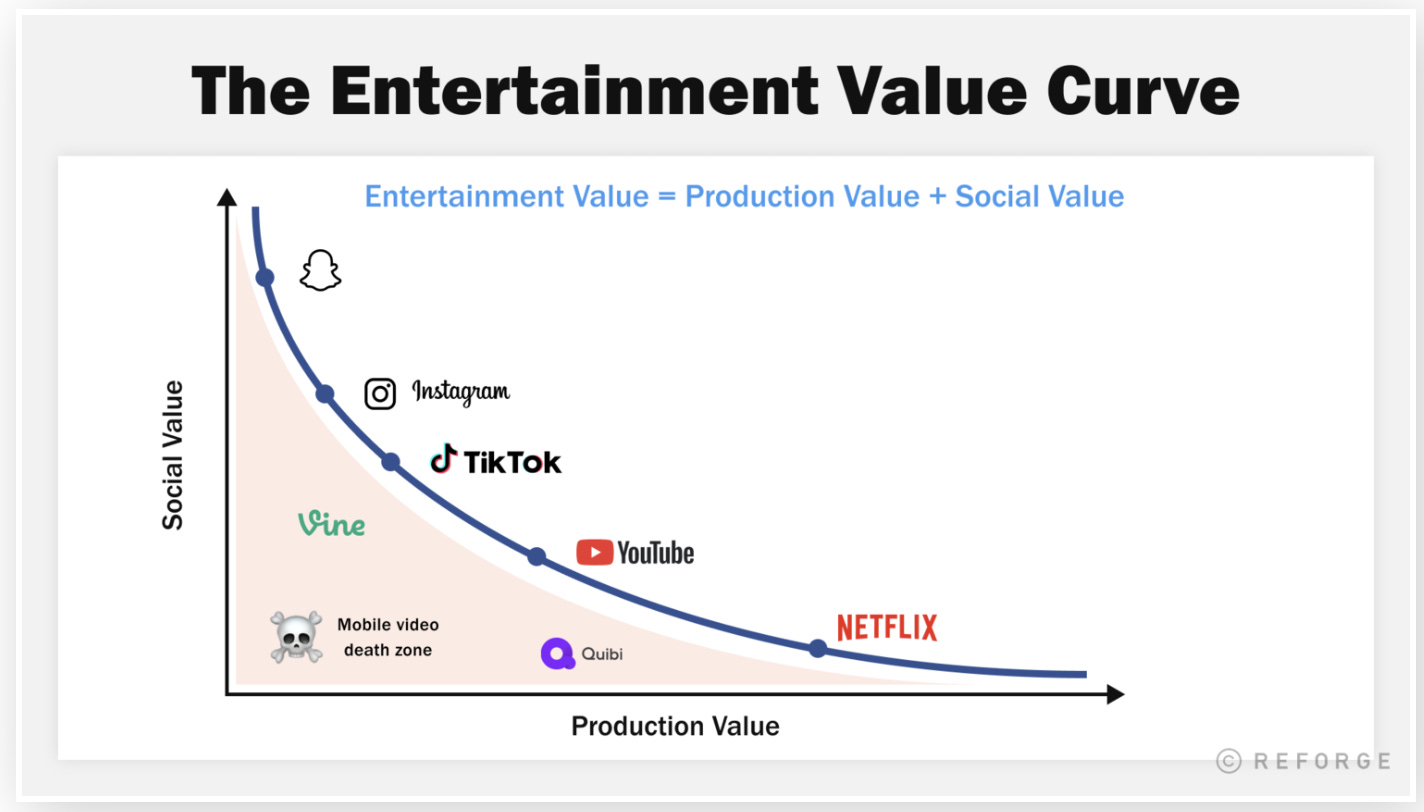📚 Entertainment value curve, Pico Iyer, Chalkboard decisions, Best business books
Neighbours & Friends + a lot more for the curious YOU
Welcome to Stay Curious #162.
I turned 40 this Sunday. I’m on the other side of youth now (or so I wish to believe). Don’t worry, I am not going to do any “40 things I want to tell the younger me” stuff. I’m still exploring, I’ve not yet arrived. Wisdom can wait!
I wish to talk more about my observations, though. Pico Iyer’s work is inspiring me to take that plunge. I have some apprehension about how to do it without being superficial or preachy. If there are any recommendations for me, do let me know.
In the meantime, I will get started and figure it out as I go.
Let’s take a quick look at today’s post.
We’ve a lot of catch, let’s jump right in…
📽️ Entertainment Value Curve
Ravi Mehta’s “Entertainment value curve” takes a dig at possible reasons for why Tiktok worked and Quibi was a disaster. His reasoning is built on what he calls the “entertainment value curve”.
While the history of Tiktok and Quibi may not be of interest, the underlying approach to decode mobile video products is quite useful and worth reading.
A couple of noteworthy snapshots starting with a overview of this concept:
🎴 Pico Iyer’s Writing
Last week, I chanced upon listening to a couple of podcast episodes featuring Pico Iyer. For the uninitiated, Pico Iyer is a travel writer, novelist and an essayist. He has spent more than 3 decades in Japan and has written extensively about the culture & people there.
I heard him talking about “the spiritual case for travel” and “understanding Japan.” These were some of the most fascinating conversations I’ve heard in the recent times. Pico has a poetic touch and it shows in the way he brings the beauty of even the simplest of the observations. He talks about the emphasis on ‘listening’ in Japanese culture and he shows a great deal of it himself. His voice has a certain soothing charm about it, I can go on and on.
I picked up “A beginner’s guide to Japan : observations and provocations” after listening to these podcasts and I’m glad I did it. It celebrates Pico’s curiosity & attentiveness. He describes even a mundane thing in the most beautiful way and takes you to his world. It kept me intrigued, I was smiling on every page.
I highly recommend this one. 💯
Here’re a couple of bits from the book:
“Strangers routinely sleep with their heads on strangers’ shoulders on Japanese trains, and the leaned-upon agree not to flinch. A sign of trust— of community, perhaps—but also a reminder that what constitutes public and what constitutes private is something subtler than homes and walls.”
“Japan has a sharp-edged sense of what can be perfected—gizmos, surfaces, manners—and of what cannot (morals, emotions, families). Thus it’s more nearly perfect on the surface than any country I’ve met, in part because it’s less afflicted by the sense that feelings, relationships or people can ever be made perfect.”
Naina had gifted me one of Pico’s books almost a decade ago, but I could not appreciate his writing then. Now I find myself in a very different boat. I mentioned this to Naina and she reverted “Books call to us when it's our time to read them”. I’ve to agree with her here. Listen to the podcast and see if you’re ready to read Pico Iyer.
❓ Chalkboard Decisions
Filing this in ‘Food for thought’. Screenshot from FS blog post of the same title.
(Source & Credit FS Blog)
💡 POSIWID
Anil Dash expands
POSIWID = Purpose of a System is What It Does
It’s not a very intuitive understanding, and Anil admits as much. He goes on to expand his discoveries and how this idea can be a game-changer if you fully embrace it.
Sample this:
Through this lens, we can understand a lot about the world, and how we can be more effective in it. If we accept that the machine is never broken (except in the case of the McDonald’s ice cream machine), then we can recognize that driving change requires us to make the machine want something else. If the purpose of a system is what it does, and we don’t like what it does, then we have to change the system. And we change the system by making everyone involved, especially those in authority, feel urgency about changing the real-world impacts that a system has.
It’s a short essay, but can give a lot to munch on. Fundamentals of system thinking are ingrained in simple truths and this one is one of those.
(via The FLUX Review)
📚 Best Business Books
Tyler Cowen suggests that the best business books aren’t actually about business. They are biographies of musicians and sportspersons. And they can teach us a lot more about business & people than any business or self help book.
Here’s his proposal:
I thus have a modest proposal for anyone interested in business books: Read books about specific businesses or industries that you already know a lot about. That way, you will have enough contextual knowledge for the book to be meaningful. Of course many people don’t work at a company or industry big or famous enough that there are books about it, so I have a corollary proposition: You will learn the most about management by reading books about sports and musical groups.
He further explains:
Many music and sports books are not only written for obsessed fans, but also written by obsessed fans. Traditional business books, in contrast, are frequently written to get consulting work or on to the speaker’s circuit. The incentive is not to offend anybody and to put forward some “least common denominator” insights, rather than say anything truly original that might be complicated to explain.
I’ve not delved much into these two genres, so will give them a try soon. Let me know if you’ve any recommendations for this.
👿 User-proof Design
Sometimes the biggest challenge in design is not about making the product user-friendly or user centric but making it user-proof.
Rob Walker tries to build some learning from all the problems at the New York-Dublin Portal. Events at the portal and subsequent actions are a good example to reference here.
This is why the Portal became a kind of stand-in for one of the knottiest tech-design themes of recent years: dealing with problem users. Versions of this challenge have been around as long as the Internet, but the downsides of an easy-onboarding, minimal-barrier, freewheeling ideal of social media made it acute: Welcoming everybody sounds great until it sinks in that everybody can include scammers, Nazis, death threats, and more.
I’ve spent a lot of time making user-centric products, and have often found myself thinking hard about situations where the user misbehaves or misuses the product. While we’re typically biased to not build around such cases of misuse (they are expected to be low, and should not become reasons for other good users to suffer). But once in a while, we find ourselves in a situation that demands creating certain friction in the journey to deter this misuse. It’s a difficult call and pinches in the short term. But it has the power to make or break your product & business.
🏠 Neighbours & Friends
A couple of pieces covering ideas that can make our living easy & more enjoyable.
Ten lessons in neighborliness from a Cohousing Community
Radish Oakland: Live near Friends
These concepts are not novel - they have been around for generations without being called so. But we seem to have forgotten them or are not able to give them due importance. These two pieces remind us of the benefits that we’ve forgotten.
I hope to learn a thing or two about how to be a better neighbor from this, see if you find something useful for yourself.
✨ Everything else
Olivier Lei is a French street photographer. Her Instagram feed is filled with amazing shot capturing so much of life without being dramatic or staged. (via Dense Discovery)
There is something about driftwood that gives it a cute & charming vibe. Kirsty Elson amplifies it and creates whimsical animals. (via Colossal)
Things the guys who stole my phone have texted me to try to get me to unlock it. (via Kottke)
The Bear Season 3 is coming soon. Its trailer looks intense. I love this take to summarize what it promises - “So. Much. Unaddressed. Trauma. That these people are inflicting upon one another. (Men will literally open a Michelin-starred restaurant instead of going to therapy.) It seems like Carmy, not the restaurant, is the titular Bear.” (via Kottke)
Finally, in case you missed last week’s post, you can find it here.
That's all for this week, folks!
I hope I've earned the privilege of your time.
If you liked this post, please hit the ❤️ below, leave a comment or share with someone who will find it useful too. It’s highly encouraging.










Just listened to pico iyers poscast. Beautiful! Thanks! Ordering the book as well :)
Seems like the right time
Firstly, happy birthday Pritesh! Thx for doing what you do every week via Stay Curious 👍
Loved this “Books call to us when it's our time to read them”